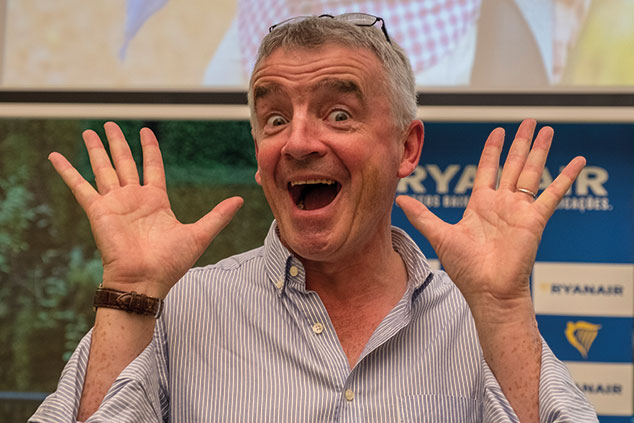
With its record of terrible service, cattle-truck conditions, and bullying extra charges, there are few companies with a worse reputation. Let’s correct that. There are no companies with a worse reputation. And yet Ryanair’s numbers are fantastic. With a market value of £12bn, it is the largest airline in Europe, overtaking all the old giants in a single generation. Measured by passengers carried, it is the fifth-largest airline in the world; measured by fleet size it is seventh. It is hard to think of another firm that has come from nowhere to take such a commanding position in one of the world’s major industries at such a rapid pace.
Michael O’Leary was one of the greats
Its founding spirit, Michael O’Leary, is one of the great entrepreneurs of recent times. Ryanair was set up by millionaire Tony Ryan, flying a single plane from Waterford to Gatwick, and for its first few years it made no money. But O’Leary saw the potential for growth in the example of Southwest Airlines in the US, which had pioneered low-cost travel. He saw that Europe would follow, and indeed outpace, the US in deregulating air travel, and that that would open up a huge new market. Over the next couple of decades, Ryanair grew and grew, adding more and more planes and routes, and along the way reinventing the industry. EasyJet borrowed its model, with more or less equal success, as did a few other competitors such as Wizz Air, but most other rivals fell by the wayside. It has been a massive achievement, and a lot of that is down to O’Leary.
He become famous for his pugnacious, combative approach to managing the business. “We don’t want to hear sob stories,” he once told customers. “What part of ‘no refund’ do you not understand?” He raged against inefficiencies, chewed out staff who didn’t perform, and cheerfully abused customers, convinced that all they actually cared about was getting to their destination as cheaply as possible.
That was great for the growth phase of the airline’s expansion. It takes aggression to barge your way into a heavily regulated, protected industry. There were a lot of vested interests to be pushed aside. Delivering dirt-cheap fares meant cutting costs to the bone, and that is never easy. Customers needed to be persuaded that the trade they made when they flew budget was that they would sacrifice some comfort and convenience for a good deal. Lots of loud-mouthing was needed to make that happen. Without it, the airline would probably still be flying a couple of turboprops up and down the west coast of Ireland.
Time for a quieter voice
The trouble is, that approach has outlived its usefulness. In the last couple of years, even with O’Leary at the helm, Ryanair had already started toning down its aggression towards its passengers. Some of the more outrageous extra charges have been dropped, and a softer tone has been adopted. That was badly needed.
Its main rival, easyJet, which has long since distanced itself from its founder Stelios Haji-Ioannou, has found a way of combining cheap fares with levels of service that, while not exactly deluxe, stay just on the right side of tolerable. So have many other airlines. Sooner or later Ryanair’s miserable reputation was going to curb its expansion, and it may have already done so. The real opportunity now is to expand into medium and long-haul routes. But to do that, it needs a different approach. Flyers might tolerate Ryanair standards on a 120-minute hop from London to Barcelona. A 13-hour flight to Bangkok is something different.
Lots of founding entrepreneurs, which is what O’Leary essentially is at Ryanair, find it hard to move on. They cling on too long, and end up damaging the companies they created. Ryanair has the opportunity to become one of Europe’s biggest businesses. But to get there, it needs to normalise itself. That doesn’t seem likely while O’Leary is still around. The task of the shareholders is to find a way to persuade him to bow out gracefully. It isn’t usually easy – but if they can’t do that, the business may never grow up or fulfil its potential.